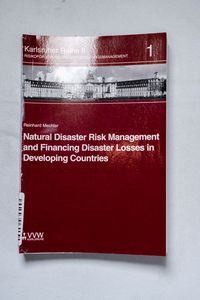
Natural disaster risk management and financing disaster losses in developing cou - Mechler, Reinhard
Netto: 18,69 €20€
inkl. MwSt. zzgl. Versand
Bearbeitungszeit: 3 Werktage
Sofort lieferbar (auf Lager)
1x Stück verfügbar
Artikelzustand Mangelware (nachgebunden):
- Stark gebrauchter Zustand / Mangelware
- Buchrücken fehlt und wurde maschinell nachgebunden
- Seiten können fehlen, weil die Prüfung aller Seiten zu zeitaufwendig ist
- Coverseiten können vom Text abgeschnitten sein
- Vereinzelte Seiten können lose sein
- Blattübergänge können Unterschiede aufweisen
- Es handelt sich um Jahrzehnte alte Bücher, die nicht für Allergiker oder anspruchsvolle Kunden geeignet sind
Buchzusammenfassung:
Natural disasters may cause large economic impacts and impede socioeconomic development in developing countries considerably. Increasingly, risk management, the management of disasters before the actual occurrence of events, is being advocated. Risk financing measures taken by national governments, such as insurance und reinsurance, are important components of a risk management strategy. Often developing countries are not able to finance the costs of relief and reconstruction by their own means and have to rely on the international donor community as their reinsurer of last resort. The main objective of the book is to establish a platform to provide information on the costs caused by disasters and the costs and benefits of disaster risk management focusing on ex-ante risk financing measures taken governments in developing countries. The final objective is to provide insight into the specific conditions where risk financing may constitute an option that provides net benefits and increases social welfare. The modelling using a stochastic simulation approach incorporates probabilistic information on the direct losses due to natural disasters into a macroeconomic projection model. Outputs are macroeconomic flow impacts such as impacts on GPD. In order to analyze the costs and benefits due to undertaking risk management measures, a Cost-Benefit Analysis approach is employed using the mean-variance method. Two case studies are conducted on countries with different exposures to disaster risk and different economic vulnerabilities: Honduras and Argentina. A major insight derived from the case studies is that under certain conditions risk financing arrangements may decrease the vulnerability to natural hazards resulting in more robust development in developing economics.





